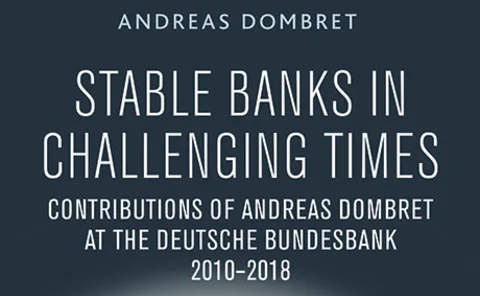Supervision
BoE partners with QA Media to benchmark software investments
Central bank aims to improve own software development processes, and those in the banking sector
Podcast: Georgia’s data-driven response to Covid-19
Covid-19 has provided the NBG a chance to test out its new data capabilities
Fed finalises Volcker rule reform
Amendments permit banks to return to risky activity seen in 2008 financial crisis, Lael Brainard warns
Fed caps dividends after stress tests show big potential losses
Brainard says decision not enough as tests show loan losses could exceed those during financial crisis
Book notes: Stable banks in challenging times, by Andreas Dombret
Dombret’s stability and rule-based compass should be that for every aspiring central banker, worldwide
Fed to assess banks’ management during Covid-19
Supervisors evaluating business and operational strategies, cyber security and market risk assessments
NGFS offers concrete next steps to assess climate vulnerabilities
New climate risk scenarios will be incorporated into Bank of England stress tests and Bundesbank economic modelling, write Sarah Breeden and Sabine Mauderer
Bafin says it did not supervise scandal-hit Wirecard
Official tells Central Banking he is “not aware” of any agency supervising firm implicated in fraud
Iran’s race towards monetary policy reform faces high hurdle reality
The Majlis Research Center’s Tohid Atashbar says positive outcomes from the Iranian central bank’s fast-tracking of monetary policy reform – made in response to Covid-19 and US sanctions – may prove difficult to deliver
Fears rise over breakdown in Basel and IFRS standards
Bretton Woods institutions worried about growing divergence in capital and accounting standards as credit impairment tsunami looms; US and many emerging economies skirting the rules
High US inflation should not be ruled out
A prolonged health crisis raises the risk that supply-side factors, monetary expansion and rising personal savings could stoke hidden inflationary pressures
NGFS proposes five steps to integrate climate risks into supervision
Guidelines follow ECB’s public consultation on adding climate risks to its supervisory work
Crisis exposes flaws in US financial stability regime
Former Fed chair Janet Yellen urges Congress to reform US’s financial stability framework, after failure to curb corporate leverage in the lead-up to lockdown
OCC chief resigns immediately after finalising controversial regulation
FDIC abandons support at final hour after facing strong criticism from Democratic senators
ECB to integrate climate risks into supervision
Climate change is pushing banks to adapt risk management, disclosure, governance and business strategies
Bank of Canada warns of major rise in mortgage arrears
Mortgage arrears could rise to levels nearly double seen in global financial crisis, central bank says
The impact of AI adoption on supervisors
MAS’s former data chief says a triad of basic AI training, supervisor data scientist hubs and suptech adoption create strong foundations
Tighter supervision improves bank performance – NY Fed paper
Researchers examine performance of heavily and lightly regulated banks from 1991 to 2014
BIS and G20 launch cloud-based ‘tech sprint’
New initiative will help regulators leverage technology to improve supervision of financial sector
BoE’s Proudman recommends data-gathering rethink
“Pull” model would be “revolutionary” but might come at too great a cost, official says
Libra’s Disparte on big tech’s move into digital currency
Libra Association vice-chair Dante Disparte speaks about the decision to abandon a multi-currency reserve, stress-testing a global payment network and how the Facebook-backed body still has 3 billion customers in its sights
Coronavirus latest: Central banks respond to the Covid-19 crisis
Live coverage as central banks respond to the virus outbreak (live feed is now closed)
National Bank of Denmark divests stake in securities firm
Central bank will sell its 24.2% ownership of VP Securities to Euronext
FSB consults on cyber attack ‘response and recovery’
“Efficient and effective response” is critical to minimising the financial stability impact, report says























